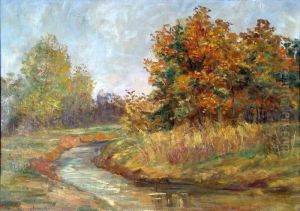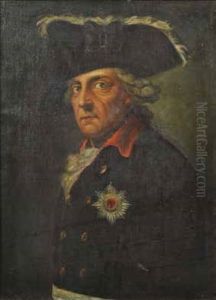Oskar Hassebrauck Paintings
Oskar Hassebrauck was a German artist known for his contributions to painting and graphic arts. Born on October 15, 1891, in Elberfeld, which is now a part of Wuppertal, Germany, he grew up during a period of significant change and development in the German art world. Hassebrauck's career spanned across pivotal art movements of the 20th century, including Expressionism and New Objectivity (Neue Sachlichkeit).
Hassebrauck's artistic journey began with his studies. He attended the Kunstakademie Düsseldorf (Düsseldorf Academy of Arts), where he was influenced by the teachings of notable artists such as Peter Behrens. His early work was characterized by a strong leaning towards expressionistic styles, which were prevalent during his formative years as an artist. However, as his career progressed, he began to develop his own distinctive style that combined elements of realism with a more nuanced, introspective approach to subject matter.
During the 1920s and 1930s, Hassebrauck's work began to reflect the aesthetics of the New Objectivity movement, which sought to depict reality in a stark and unembellished manner, often focusing on the social issues of the time. His paintings and graphics from this period reveal a detailed attention to form and a sober palette, capturing the mood of the interwar years in Germany.
The rise of the Nazi regime and the outbreak of World War II had a profound impact on Hassebrauck's career, as it did for many artists of the time. The political climate and the strictures imposed by the Nazis on artistic expression led to a period of difficulty for Hassebrauck, as for others whose art did not conform to the prescribed ideals of the regime.
After the war, Hassebrauck continued to work, though the art scene had been irrevocably altered by the events of the preceding years. He witnessed the emergence of new art movements such as Abstract Expressionism and Pop Art, which dominated the post-war art world. Despite these changes, Hassebrauck remained committed to his unique style, continuing to produce work that reflected his personal vision.
Oskar Hassebrauck passed away on March 13, 1964, in Wuppertal. His contributions to German art are remembered for their reflection of a tumultuous era and for their distinctive blend of realism and personal expression. His works are held in various collections and continue to be studied for their historical significance and artistic merit.

